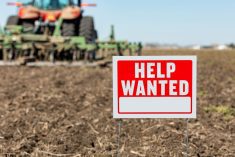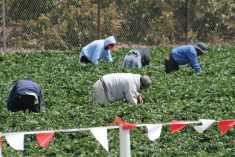Ottawa — Canada’s agriculture industry is seeking an initial $2.6 billion in COVID-19-related emergency relief funding from the federal government.
Canadian Federation of Agriculture (CFA) officials put in the ask to the federal government on Thursday.
According to second vice-president Chris van den Heuvel, federal officials asked the CFA “to go and put hard numbers around the ask” for the industry.
That prompted the CFA to consult its members and commodity groups to arrive at the $2.6 billion figure, which would cover costs and losses related to COVID-19 so far.
Read Also

Alberta crop conditions improve: report
Varied precipitation and warm temperatures were generally beneficial for crop development across Alberta during the week ended July 8, according to the latest provincial crop report released July 11.
To date, CFA estimates $1.6 billion in losses due to the shutdown of the foodservice sector, while processing capacity and supply chain disruptions have resulted in $900 million in losses. Increased labour costs, including the purchase of personal protective equipment, have cost the sector $50 million.
“We’ve been asking for about a month now for support for the industry, and it’s been falling on deaf ears as far as the government is concerned,” said van den Heuvel.
Prior to the call for $2.6 billion, the CFA had requested the federal government improve returns through business risk management (BRM) programs, particularly AgriInvest and AgriStability.
Those requests remain in place, despite continued complaints from CFA officials that the government has so far refused to respond.
Van den Heuvel and others within the industry have suggested in recent weeks their frustration is not with Agriculture Minister Marie-Claude Bibeau, but her colleagues in the federal cabinet.
Sources suggest there is a reluctance among some federal officials to offer emergency relief to producers because existing BRM programs are already in place to support the industry.
“I think the issues were coming from higher up,” van den Heuvel said, who later added the $2.6 billion in relief funding will rely on how much Prime Minister Justin Trudeau and Finance Minister Bill Morneau value agriculture and food security.
“That’s what this this issue all boils down to, is whether or not our politicians see food security as a priority for this nation. And to date, we don’t feel that they have been,” said van den Heuvel. “If farmers start to go out of business because they can’t get through this growing season, this is going to have significant impacts down the road as far as food security is concerned.”
The $2.6 billion ask is being considered “Phase one” funding by the CFA, but van den Heuvel was unable to provide an estimate of what future funding requests may be.
“That’s a very, very difficult question to answer,” he said, noting accurate forecasting is difficult, given the situation around COVID-19. “Definitely the longer that this goes into the growing season, this number is going to be amplified greatly.”
Van den Heuvel said that if the money comes through, he would expect it to be administered through a partnership involving the federal government, the CFA and different commodity groups to ensure producers who need the money would receive it.
“That’s always a concern when you’re dealing with public dollars, that it goes to where it’s actually needed,” he said. “That’s why we’ve taken the steps of not making broad-based assumptions but going out to each of our commodity groups and asking specifically what the hurt is.”
He highlighted horticulture, beef, pork, poultry and dairy as commodities struck particularly hard by the pandemic – but said the majority of commodities have been affected in some way.
Bibeau indicated in a statement the government is exploring additional support measures.
“We understand that agriculture groups have specific needs and asks right now, and I want to assure producers that we are actively exploring additional measures to support them,” she said. “We care deeply about the well being of our farmers and farm families, and understand how stressful this period is for many of them.”
— D.C. Fraser reports for Glacier FarmMedia from Ottawa.














